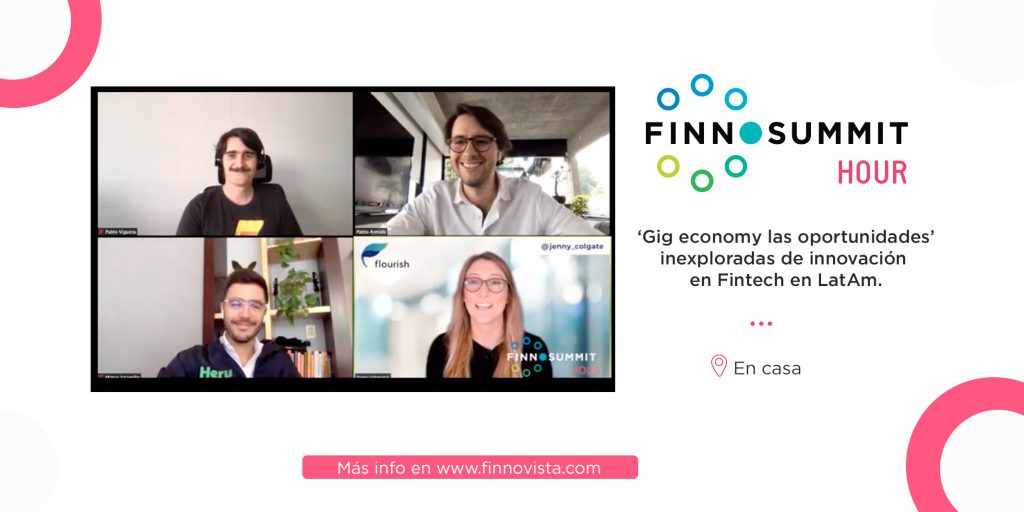The gig economy has become in Latin America a source of employment for a significant part of the population. As a result of this new labor model, there is a new growing portfolio of startups that outsource part of their services to the gig economy workers or that have products or services that improve the life quality of these types of freelance workers, for example, by offering digital employment platforms and better methods of payment for these workers. The situation generated by COVID-19 is expected to have a positive impact on the gig economy in Latin America.
On August 27th, as part of the third edition of the FINNOSUMMIT Hour, which focused on the ‘Gig economy and Fintech opportunities in Latin America’, a special panel debated about this employment model to discuss new opportunities for Fintech startups in the region to provide a better lifestyle for freelancers.
Jenny Johnston, the VC/Impact Investor of Flourish Ventures, was in charge of presenting and shooting the questions of the fireside chat between the three great speakers of FINNOSUMMIT Hour: Mateo Jaramillo, CEO of Heru; Pablo Viguera, Co-Founder & Co-CEO of Belvo, and Pablo Armida, Co-founder and CPO of R5, representing three of the Latin American startups working on the gig economy solutions.
Johnston said that “only 30% of Latin Americans have bank accounts, 40% have access to savings, 20% have access to credit and less than 10% have health insurance”. “The population is huge, growing and financially vulnerable”, said the international Fintech investor.
Jaramillo shared his previous experience at Uber, mentioning that the flexibility presented by the digital platforms of the gig economy is very attractive, since they offer temporary job offers with great benefits and the possibility that workers can handle them at their own convenience. “Without a doubt, this offer has evolved and helped change the way people in Latin America behave as a consumer and have a new opportunity to generate income in difficult times like these”, said the CEO of Heru, a startup that improves the conditions of independent workers.

“Probably the gig economy has evolved in the last six months what should have evolved in two years. There are many factors that change the labor dynamics, and I believe that even so there will be many job offers that will migrate towards the work of the gig economy”, commented Jaramillo.
Benefits of the ‘gig economy’ for the Fintech sector
Armida commented that “digital platforms users of the gig economy have used them as a strong benefit for their own economy, since it became a decent and recurrent income”.
The speakers’ conversation with each other and with Jenny Johnston at the FINNOSUMMIT Hour confirmed that there has been a great deal of enthusiasm within the Fintech community in Latin America for open banking, because of its ease of connection to different banking data that helps build better products and improve democratic access to finance for these gig economy workers and those of other industries.
“There is a great opportunity to bring technology to those who do not have access to more traditional banking services and products, through specific financial products to really increase inclusion and increase the total size of the product”, confirmed Viguera.
The third edition of the virtual appointments with FINNOSUMMIT was concluded talking about the impact of the COVID-19 in the gig economy, highlighting that it is clear that Latin America needs to invest in this new system to create new products or to join forces with partners such as Heru, R5 or Belvo to offer more and better job opportunities in Latin America.
“COVID definitely exacerbated the need for the gig economy workforce and for us as entrepreneurs to change the established base so that we can continue to grow in that direction”, Jaramillo concluded.
This third edition also featured the pitches of three Fintech startups that use the gig economy to work in a freelance modality: Ábaco LATAM, which offers microcredits for independent workers; Pago 46, a real-time cash processing network that allows companies to offer their clients cash payments in online stores; and Truora, which helps in fraud prevention and background validation in Latin America.
FINNOSUMMIT Hour is supported by Galileo Financial Technologies y Tiaxa, sponsors in addition to the partners Get Fintech, Portal FinDev, Seedstars, South Summit, Tecnológico de Monterrey, Adofintech, Asociación Fintech Guatemala, Buen Trip Hub, Startup Perú, Innóvate Perú, Wayra, Fundación Capital and FintechExpert.
Finally, we would like to thank our media partners for their support too: TyN Media Group, Colaborativo NET, The Standard CIO and PRO Magazine.
